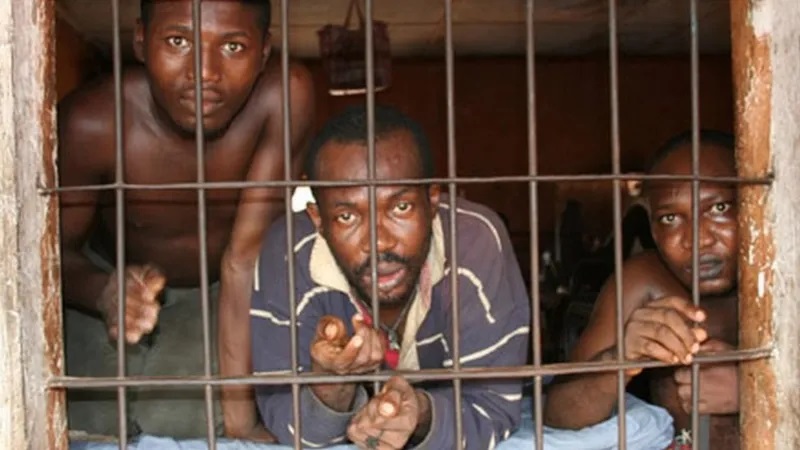NEWS RELEASE
Avocats Sans Frontières France (Lawyers Without Borders France) under its EU-funded Strengthening National Actors’ Capacity for Ending Severe Human Rights Violations (SAFE) project, is proud to announce it has secured the unconditional release of Moses Abiodun, a Nigerian citizen unjustly detained for over 16 years without trial. This landmark judgment by the ECOWAS Community Court of Justice represents a strong victory for human rights, personal liberty, and accountability within the West African region.
The Ordeal of Moses Abiodun
Moses Abiodun, a businessman, was arbitrarily arrested in November 2008 by officers of the notorious Special Anti-Robbery Squad (SARS) of the Lagos State Police Command. His arrest was an attempt to apprehend a friend accused of armed robbery. Despite his friend’s subsequent arrest and tragic death in SARS custody, Mr. Abiodun was not released. Instead, he endured five months of detention at the Lagos State Police Command, where he was subjected to torture and cruel indignities. On March 23, 2009, he was provisionally remanded in custody at the Nigerian Correctional Service Centre, Kiri Kiri, Lagos, on charges of conspiracy and armed robbery. Shockingly, for 16 years, he was never formally charged, tried, or convicted of any offence, effectively languishing in prison as an innocent man.
ASF France’s Relentless Advocacy and Fight for Justice
ASF France, through its dedicated counsel, Chigozie Ikedimma, Esq., took up Mr. Abiodun’s case, initiating proceedings at the ECOWAS Court of Justice. The application (No. ECW/CCJ/APP/56/22), filed on November 28, 2022, sought a declaration that Mr. Abiodun’s prolonged detention violated his fundamental human rights. The Respondent, the Federal Republic of Nigeria, initially denied the existence of SARS and records of Mr. Abiodun’s detention, even claiming the remand warrant was forged. However, ASF France’s legal team swiftly countered, providing a certified true copy of the remand warrant obtained from the Nigerian Correctional Service, which decisively disproved the Respondent’s attempts to evade responsibility. The case was heard on its merits on September 26, 2024, leading to the virtual judgment delivered on May 15, 2025.
During the proceedings, the Court firmly dismissed the Respondent’s claim that the application was “statute-barred,” reiterating its consistent jurisprudence that the limitation period under Article 9(3) of the Protocol applies only to extra-contractual liability and not to human rights cases.
The Court delivered a powerful verdict: The undeniable existence of SARS: The Court found the Respondent’s denial of SARS’s existence “insincere and without merit,” recognizing it as a unit of the Nigerian police force.
A declaration that the Federal Republic of Nigeria violated Mr. Abiodun’s rights to personal liberty, freedom of movement, a fair trial within a reasonable time, and freedom from inhuman and degrading treatment.
An order directing the Federal Republic of Nigeria to unconditionally release Moses Abiodun from the Nigerian Correctional Service Centre, Kiri Kiri, Lagos, where he had been unjustly detained for 16 years.
An order directing the Respondent to pay compensation to Mr. Abiodun for his unlawful detention. The Applicant had sought the sum of N20,000,000.00 (Twenty Million Naira) in damages.
The Court drew upon its own established jurisprudence and relevant international precedents, such as African Commission v Libya, Gregory J Todd v Federal Republic of Nigeria, and Haregewoin Gabre-Selassie and IHRDA (on behalf of former Dergue Officials) v Ethiopia, reinforcing the illegality of arbitrary and prolonged detention.
Also, on international and regional human rights law citing: African Charter on Human and Peoples’ Rights: Specifically, Article 6 (right to liberty), Article 12(1) (freedom of movement), Article 7(1)(d) (right to a fair trial within a reasonable time), and Article 5 (freedom from cruel, inhuman, or degrading treatment).
International Covenant on Civil and Political Rights (ICCPR): Articles 9 (liberty and security of person), 12(1) (freedom of movement), and 7 (freedom from torture or cruel, inhuman, or degrading treatment).
With a beacon of hope and speaking in a closed-door media briefing, the Country Director of ASF France in Nigeria, Angela Uwandu Uzoma-Iwuchukwu emphasized the significance of the successful judgement saying: “This judgment is a powerful affirmation of the rule of law and a testament to the resilience of human rights defenders. Moses Abiodun’s release after 16 years of egregious injustice serves as a crucial reminder that no individual should be forgotten or denied their fundamental rights, and states must be held accountable for their actions. This marks a significant step towards ensuring justice for victims of human rights violations in the ECOWAS region and reaffirms the vital role of the Community Court of Justice in upholding human rights.”
Signed – Angela Uwandu Uzoma-Iwuchukwu,
Country Director, Avocats Sans Frontières France.
About Avocats Sans Frontières France (ASF France)
Avocats Sans Frontières France (Lawyers Without Borders France) is an international non-governmental organization dedicated to defending human rights and promoting access to justice for the most vulnerable populations. Through legal aid, capacity building, and advocacy, ASF France works to strengthen the rule of law and fight against impunity for severe human rights violations worldwide. The EU-funded Strengthening National Actors’ Capacity for Ending Severe Human Rights Violations (SAFE) project aims to empower national actors to combat human rights abuses effectively.
____________________________________________________________________
(C) CITY LAWYER Magazine. All rights reserved. To join our Channel, click here. Click here to join our WhatsApp chatroom. Contact us at citylawyermag@gmail.com or 081-3838-0083.


Leave a Reply
You must be logged in to post a comment.